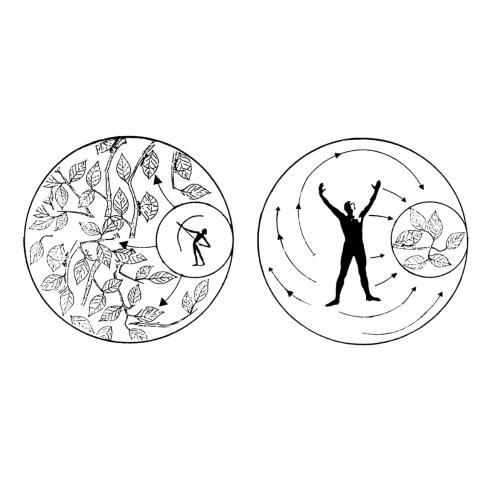Reframing Relationships Between Humans and the Earth: The "Anthropocene", a New Ideology to Sustain the Status Quo

Environmentalists associate the political and economic status quo with desertification, pollution, deforestation, loss of biodiversity, global warming, uncontrolled waste and many other consequences related to governance and general well-fare, that affect the majority of destitute people that lack educational, social and economic means to protect themselves.
Although it received little acceptance among ecologists and geologists, the term Anthropocene, proposed by chemist Paul Crutzen and biologist Eugène Stoermer at a meeting of the International Biosphere-Geosphere Program, was adopted by Francine McCarthy of Brock University, in view of the beginning of a “new geological epoch”.
“Systemic” interpretations, supported by theories of “complexity” and the “Anthropocene” as a new era in human history, may inadvertently obscure the role and effective action of people and groups that control economics and politics in today's world, who find an easy excuse to decline their responsibilities in the destinies of humanity.
Jason W. Moore (Binghampton University), described the Anthropocene argument as “a conceptual and historical mess, a neo-Malthusian view of population, a fanciful historical interpretation”. It is not just about a word, but a misleading way of understanding things, affecting communication, advocacy, public policies, research and teaching programs.
The studies on this subject, of course, leave no doubt about the consequences of human action on the environment, which alter the characteristics of existing species (many in the process of extinction), with dire consequences on the humankind, susceptible to physical and mental changes, due to a set of related environmental and cultural causes.
But the evils attributed to the “Anthropocene” are not the responsibility of all humanity; the main culprits, who have the political and economic power to shape the forms of production and consumption and define lifestyles, must be distinguished from the majority of the population, whose power to change things cannot be compared with those.
If responsibility is attributed indiscriminately to all of humanity or to the complexity of contemporary life (systemic approaches), political and economic actors would be exonerated from their responsibilities The selective disposal of waste by households does not exempt packaging industries from producing it (cardboard, bags, plastic, etc.).
The proliferation of automobiles or trucks, the construction of highways, are directly linked to public policies that neglected locomotion on rails (passengers and cargo), for public transport in cities and between cities, which is still a competing means of transport in different countries of the world. Is it only up to citizens to leave their cars at home?
“The idea that everyone is to blame for damage to ecosystems and climate change hides the real culprits”, says S. Falzi. According to this author, an ecologist and UN environmental negotiator, we are in the era of the “corporatocene”, another term for the “capitalocene”, that is, capitalism, as a way of organizing relations of exploitation between man and nature.
As long as profitable policies and practices remain unchanged (business as usual), a series of political, economic, social and environmental problems cluster and worsen around the world and have a synergistic effect, reinforcing each other. This would define the current era that some scholars classify as the corporatocene or capitalocene era.
Although “complexity” implies diversity, a large number of interdependent parts, it has been recognized that the “whole” does not entirely control its parts. People always have, under different circumstances, the option of complying with or opposing, through their thoughts and actions, the prevailing culture, although in many cases this comes at a price.
Systems thinking is proposed to understand and deal with many problems, expanding the range of options to deal with them. The focus is not on isolated variables, but on the interconnections between them, as they combine to produce phenomena, interweaving different dimensions of being in the world (intimate, interactive, social and biophysical).
Could the “system” explain everything, or is something missing from this equation? The verdicts of international courts could clarify many conceptual frameworks, by correctly identifying individuals, who, within a “system”, commit crimes and atrocities, not only in wars, but also in different environmental, political and economic circumstances.
The systemic analysis does not apply, for example, to the problem of population concentration in large cities, which occurs to the detriment of the development of small towns and rural areas, of family farming, as an option for the production of organic food, which would not require the vast tracts of land for the production of goods for export.
Localism describes a range of political philosophies which supports local production and consumption of goods, local control of government, and promotion of local history, local culture and local identity, giving the power into the hands of local councils, communities and individuals to act. Localism can be contrasted with globalization.
There are no complex problems, but problems that become complex. According to Peter Sloterdijk,“because everything has become problematic, everything is also a matter of indifference”; Adam Kirsch adds that “if humanity’s technological progress can be compared to climbing a mountain, then the Anthropocene finds us perched on a crumbling ledge.
The inequalities of wealth and opportunities, the circumstances that prevent people of lower socioeconomic status from going beyond the daily concerns of survival, add to the indifference of the richest people, who, immersed in the profitable "world of business", remain concerned only with maintaining the “panorama” in which they are inserted.
In a world stripped of moral principles, in the absence of things that really matters in life, the conspicuous consumption of goods widely trumpeted as a sign of status and prestige in the "anything goes" of advertising campaigns, has tempted young people from the less favored populations to go to crime to get things valued by the “system”.
The consumption of narcotics is a symptom of the “general phenomenon”, of the deficient attention to the physical, social and mental health of entire populations, of an economic, political, cultural and educational crisis, aggravated by the lack of structured services and community participation to deal with the problems before they get chronical.
Contemporary crisis, involving the environment, economy, society and politics."imply a fundamental transformation of values, beliefs and social practices in many sectors of society" (Lidskog, Standring & White), calling for a "redeeming change" , a transformation that cannot be confused with "techno-scientific fixes” and vigilance devices.
The United Nations Secretary-General urged world leaders to present a “Rescue Plan for People and Planet” (2023 SDG Summit), taking into account national and global commitments to inclusion and sustainability, the impact of multiple crises and interconnected political, social, economic and environmental consequences.
In the face of rapidly increasing global climate and environmental problems (first, do no harm), the Alliance of World Scientists (AWS), intent on turning accumulated knowledge into action, is calling on the world's scientists to become signatories to a document in the face of an emergency situation, in view of a collective international responsible voice.
The process faces the intense lobbying of business corporations and the fleeting glare of headlines on segmented issues; it must focus on the permanent vigilance over global conventions and international pacts, on the implementation of legislation and be alert to the actions of politicians, who may place private interests above the public good.
Drawing by André F. Pilon
